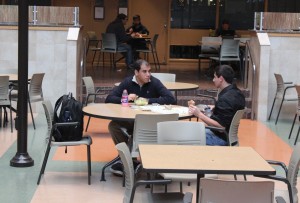
Junne Park, Photo Editor
Director of Dining Services Cam Schauf presented three new options for meal plans for the 2013-14 academic year at a Dining Committee meeting on Tuesday, Oct. 30. Schauf previously presented the plans at a Students’ Association Senate meeting on Monday, Oct. 22; they did not undergo any substantial revisions in the interim.
The first option Schauf presented involves taking the current group of students who have Unlimited plans and splitting it in two. Those who live in the freshmen dorms will continue to use Unlimited Plans and the students who live in non-freshmen housing would have the option of a lower minimum required plan, thereby providing more flexibility, but less Declining.
The second option involves a smaller Unlimited plan in which students could choose to have a plan with 150 meals at dining halls along with $850 in Declining for the same price of the equivalent current Unlimited plan.
The third option involves a fee that accounts for the cost of labor and other expenses and would be separate from the dining plan — in other words, a dollar-for-dollar Declining plan for each student.
Schauf stressed the importance of Dining’s overhead, which includes these labor, facilities and maintenance costs. The overhead is a fixed cost while the price of food can fluctuate depending on supply and demand from students. Schauf explained how it causes much of the problem in the current system and in any proposed plan, citing that almost every other school has a higher percentage of each student’s dining plan contributing toward the overhead.
“If we follow these other schools, it allows us to cover overhead and go into more flexibility in meal plans,” he said.
Currently, the Unlimited plan carries most of the burden of the overhead. Schauf and the rest of Dining Services are working to make the Unlimited plan more appealing so that the overhead would be covered. When more students are on the Unlimited plan — or a plan of equal cost — the overhead will be met.
Students had some questions about the proposals as well as concerns about the dining facilities themselves, such as the optimal hours of operation to accomodate students with dietary restrictions. Schauf addressed these concerns by saying that the new dining plans aim to reduce the number of students appealing to change their plans and maximize the use of facilities.
In a vote which concluded the meeting, almost all the students in attendance expressed support for the second proposed option.
Konowitch is a member of the class of 2015.




